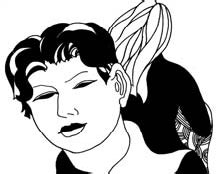Where do officials do their jobs?

The People's Daily reported on Monday that the Hubei provincial disciplinary authorities had recently issued a notice forbidding Communist Party and government officials from visiting "business-oriented entertainment venues". The notice comes in the wake of a waitress killing of an official, avowedly to protect herself from rape, in Badong county in the province.
The notice urged all officials in the province to "draw a lesson" from the case, which "has produced a baneful influence on society". The case triggered nationwide concern about the fate of the waitress, whom most people admired for her "courage to defend her integrity and chastity". The public also vented its anger against the officials who allegedly forced the girl to provide "special service", a euphemism for sex.
In Chinese official jargon, "business-oriented entertainment venues" refers to bars or baths that provide services of karaoke, dancing, bathing or massage, usually along with the company of young women, or "Misses", some of whom may provide "special service" on request.
The phrase - "forbidding officials from visiting business-oriented entertainment venues" - may sound very familiar to the public. There had been similar warnings in the past, too, issued by the authorities.
Just 11 days before the Badong case happened, the Hubei provincial committee of the Communist Party and the Hubei provincial government held a video conference on "fighting corruption and building clean government", which all officials above county level attended.
Officials are supposed to have both "moral integrity and professional competence" before they are recruited or promoted. And, keeping away from suggestive entertainment venues is what a man of moral integrity should do. Then, why are so many officials fond of visiting such places? How many of them indulge in such a diversion?

Yesterday, the People's Daily published the responses of 105 officials (of "grassroots organizations of government and the Party in four provinces") to a questionnaire about their spare-time pursuits.
The answers are interesting. Take the question "Why do you visit business-oriented entertainment venues in your spare time?" Close to half (49 percent) cited the "necessity for establishing connections"; 31 percent said that "it was needed for the purpose of fulfilling work requirements"; and 20 percent admitted to the "personal need for relaxation."
The answers are revealing on at least two counts. First, all of these officials have experience of visiting such places. Second, a bulk of them went to such places for "the purpose of work".
Personal integrity aside, the second reason merits discussion. How come that visiting such dubious places has become part of an official's work? Are such visits really an indispensable part of one's work? If true, it is terrible and shocking. Such a trend suggests that the practice has made its way into the routine functioning of grassroots governments.
I still do not believe it, but I have to admit that the problem is serious enough. Besides Hubei province, a few other places have also issued similar notices after the Badong case. Earlier, in March, the Ministry of Public Security put out a similar notice warning officers against patronizing such places.
Earnest, effective, and maybe tough, measures need to be taken to reinforce the ban and punish those who flout the rules.
In the interests of transparency, the public may be invited to monitor the execution of the regulations.
E-mail: liushinan@chinadaily.com.cn
(China Daily 06/10/2009 page8)














